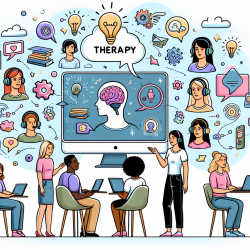Introduction
In the realm of speech-language pathology, the implementation of effective strategies is crucial for achieving optimal outcomes, particularly when it comes to online therapy services like those provided by TinyEYE. The Expert Recommendations for Implementing Change (ERIC) project offers a comprehensive compilation of implementation strategies that can significantly enhance the delivery of online therapy services in schools. This blog aims to explore the key findings of the ERIC project and how they can be applied to improve the skills of practitioners in the field.
Understanding the ERIC Project
The ERIC project, as detailed in the research article titled "A Refined Compilation of Implementation Strategies: Results from the Expert Recommendations for Implementing Change (ERIC) Project," sought to address the inconsistencies in implementation strategy terminology and definitions. By engaging a panel of experts through a modified Delphi process, the project refined a compilation of 73 discrete implementation strategies. These strategies are designed to enhance the adoption, implementation, and sustainability of clinical programs or practices.
Key Implementation Strategies
For practitioners in speech-language pathology, particularly those involved in online therapy, several strategies from the ERIC compilation stand out:
- Develop a Formal Implementation Blueprint: This involves creating a detailed plan that outlines goals, strategies, and performance measures. For online therapy, this could mean developing a blueprint for integrating new technologies or therapy methods.
- Conduct Ongoing Training: Continuous professional development is essential. Implementing regular training sessions can ensure that practitioners stay updated with the latest methodologies and technologies.
- Use Data Warehousing Techniques: By integrating clinical records across platforms, practitioners can facilitate better data-driven decisions, improving therapy outcomes.
- Engage Patients and Families: Involving families in the therapy process can enhance adherence and outcomes. This strategy emphasizes the importance of communication and collaboration with stakeholders.
Encouraging Further Research
While the ERIC project provides a robust framework, it is crucial for practitioners to engage in further research to tailor these strategies to specific contexts and populations. Speech-language pathologists should consider the unique needs of their clients and the specific challenges of online therapy when applying these strategies.
Conclusion
The refined compilation of implementation strategies from the ERIC project offers valuable insights for speech-language pathologists, particularly those involved in online therapy services. By leveraging these strategies, practitioners can enhance their skills and improve therapy outcomes for children. For those interested in delving deeper into the research, the original paper provides a comprehensive overview of the methodology and findings.
To read the original research paper, please follow this link: A refined compilation of implementation strategies: results from the Expert Recommendations for Implementing Change (ERIC) project.










